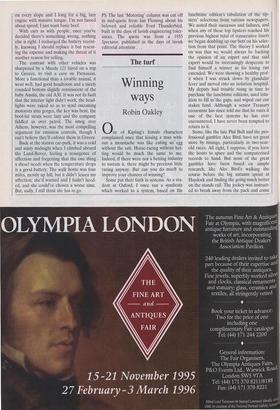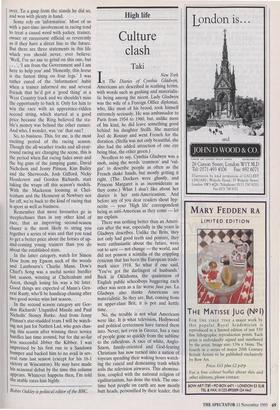The turf
Winning ways
Robin Oakley
ne of Kipling's female characters complained once that kissing a man with- out a moustache was like eating an' egg without the salt. Horse-racing without bet- ting would be much the same to me. Indeed, if there were not a betting industry to sustain it, there might be precious little racing anyway. But can you do much to improve your chances of winning?
Some put their faith in systems. As a stu- dent at Oxford, I once ran a syndicate which worked to a system, based on the lunchtime edition's tabulation of the tip- sters' selections from various newspapers. We noted their successes and failures, and when any of these top tipsters reached his previous highest total of consecutive losers we began doubling up our bets on his selec- tion from that point. The theory I worked on was that we would always be backing the opinion of an expert and that said expert would be increasingly desperate to find himself a winner as his losing run extended. We were showing a healthy prof- it when I was struck down by glandular fever and moved into an isolation hospital. My deputy had trouble rising in time to purchase the lunchtime editions, used intu- ition to fill in 'the gaps, and wiped out our stakes fund. Although a senior Treasury economist has since told me that he rates it one of the best systems he has ever encountered, I have never been tempted to return to it.
Some, like the late Phil Bull and the pro- fessional gambler Alec Bird, have set great store by timings, particularly in two-year- old races. All right, I suppose, if you have the hours to spare and the computerised records to hand. But most of the great gambles have been based on simple research, like Alec Bird's walking the course before the big autumn sprint at Haydock and finding the going much better on the stands rail. The jockey was instruct- ed to break away from the pack and come over. To a gasp from the stands he did so, and won with plenty in hand.
Some rely on 'information'. Most of us with a part-time involvement in racing tend to treat a casual word with jockey, trainer, owner or racecourse official as reverently as if they have a direct line to the future. But there are three statements in this life which you should never, ever believe: `Well, I've no axe to grind on this one, but • .. 'I am from the Government and I am here to help you' and 'Honestly, this horse is the fastest thing on four legs.' I was rather cured of the 'information' habit when a trainer informed me and several friends that he'd got a 'good thing' at a West Country track and we shouldn't miss the opportunity to back it. Only for him to win the race with an apprentice-ridden second string, which started at a good price because the Ring believed the sta- ble's money was behind the other runner. And who, I wonder, was 'on' that one?
So, to business. This, for me, is the most exciting period of the racing season. Though the all-weather tracks and all-year- round racing are changing the scene, this is the period when flat racing fades away and the big guns of the jumping game, David Nicholson and Jenny Pitman, Kim Bailey and the Sherwoods, Josh Gifford, Nicky Henderson and Gordon Richards, start taking the wraps off this season's models. With the Mackeson looming at Chel- tenham and the Hennessy at Newbury not far off, we're back to the kind of racing that is sport as well as business.
Remember that more favourites go in steeplechases than in any other kind of race, that an improving second-season chaser is the most likely to string you together a series of wins and that you tend to get a better price about the horses of up- and-coming young trainers than you do about the established stars.
In the latter category, watch for Simon Dow from my Epsom neck of the woods and Lambourn's Charlie Mann. Dow's Chief's Song was a useful novice hurdler last season, winning at Cheltenham and Ascot, though losing his way a bit later. Good things are expected of Mann's Gen- eral Rusty, who'll be handicap chasing after two good novice wins last season.
In the second season category are Gor- don Richards' Unguided Missile and Paul Nicholls' Stoney Burke. And from Jenny Pitman's star-studded team I will be watch- ing not just for Nathen Lad, who goes chas- ing this season after winning three novice hurdles last time around, but for the so-far less successful Jibber the Kibber. I was impressed by his first run in a Sandown bumper and backed him to no avail in sev- eral runs last season (except for his 16-1 victory at Wincanton). He may have made his seasonal debut by the time this column appears. Whatever happens then, I'm told the stable rates him highly.
Robin Oakley is political editor of the BBC.



















































































 Previous page
Previous page